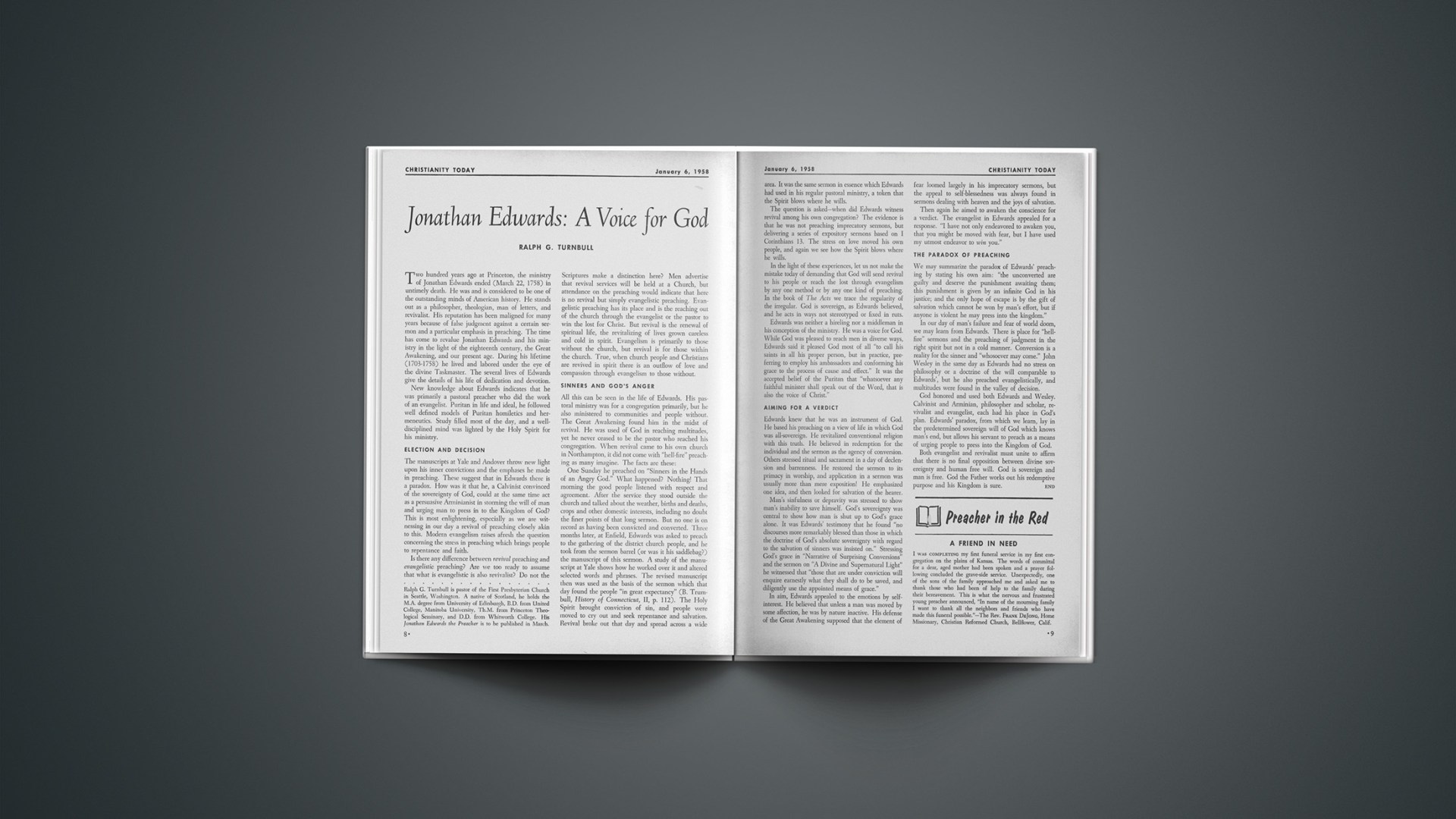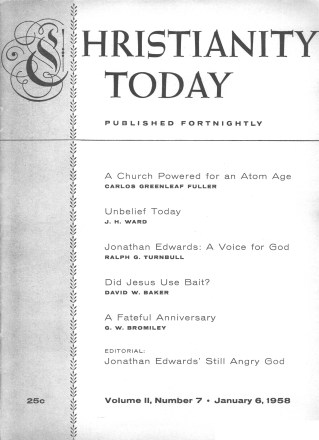Two hundred years ago at Princeton, the ministry of Jonathan Edwards ended (March 22, 1758) in untimely death. He was and is considered to be one of the outstanding minds of American history. He stands out as a philosopher, theologian, man of letters, and revivalist. His reputation has been maligned for many years because of false judgment against a certain sermon and a particular emphasis in preaching. The time has come to revalue Jonathan Edwards and his ministry in the light of the eighteenth century, the Great Awakening, and our present age. During his lifetime (1703–1758) he lived and labored under the eye of the divine Taskmaster. The several lives of Edwards give the details of his life of dedication and devotion.
New knowledge about Edwards indicates that he was primarily a pastoral preacher who did the work of an evangelist. Puritan in life and ideal, he followed well defined models of Puritan homiletics and hermeneutics. Study filled most of the day, and a well-disciplined mind was lighted by the Holy Spirit for his ministry.
Election And Decision
The manuscripts at Yale and Andover throw new light upon his inner convictions and the emphases he made in preaching. These suggest that in Edwards there is a paradox. How was it that he, a Calvinist convinced of the sovereignty of God, could at the same time act as a persuasive Arminianist in storming the will of man and urging man to press in to the Kingdom of God? This is most enlightening, especially as we are witnessing in our day a revival of preaching closely akin to this. Modern evangelism raises afresh the question concerning the stress in preaching which brings people to repentance and faith.
Is there any difference between revival preaching and evangelistic preaching? Are we too ready to assume that what is evangelistic is also revivalist? Do not the Scriptures make a distinction here? Men advertise that revival services will be held at a Church, but attendance on the preaching would indicate that here is no revival but simply evangelistic preaching. Evangelistic preaching has its place and is the reaching out of the church through the evangelist or the pastor to win the lost for Christ. But revival is the renewal of spiritual life, the revitalizing of lives grown careless and cold in spirit. Evangelism is primarily to those without the church, but revival is for those within the church. True, when church people and Christians are revived in spirit there is an outflow of love and compassion through evangelism to those without.
Sinners And God’s Anger
All this can be seen in the life of Edwards. His pastoral ministry was for a congregation primarily, but he also ministered to communities and people without. The Great Awakening found him in the midst of revival. He was used of God in reaching multitudes, yet he never ceased to be the pastor who reached his congregation. When revival came to his own church in Northampton, it did not come with “hell-fire” preaching as many imagine. The facts are these:
One Sunday he preached on “Sinners in the Hands of an Angry God.” What happened? Nothing! That morning the good people listened with respect and agreement. After the service they stood outside the church and talked about the weather, births and deaths, crops and other domestic interests, including no doubt the finer points of that long sermon. But no one is on record as having been convicted and converted. Three months later, at Enfield, Edwards was asked to preach to the gathering of the district church people, and he took from the sermon barrel (or was it his saddlebag?) the manuscript of this sermon. A study of the manuscript at Yale shows how he worked over it and altered selected words and phrases. The revised manuscript then was used as the basis of the sermon which that day found the people “in great expectancy” (B. Trumbull, History of Connecticut, II, p. 112). The Holy Spirit brought conviction of sin, and people were moved to cry out and seek repentance and salvation. Revival broke out that day and spread across a wide area. It was the same sermon in essence which Edwards had used in his regular pastoral ministry, a token that the Spirit blows where he wills.
The question is asked—when did Edwards witness revival among his own congregation? The evidence is that he was not preaching imprecatory sermons, but delivering a series of expository sermons based on 1 Corinthians 13. The stress on love moved his own people, and again we see how the Spirit blows where he wills.
In the light of these experiences, let us not make the mistake today of demanding that God will send revival to his people or reach the lost through evangelism by any one method or by any one kind of preaching. In the book of The Acts we trace the regularity of the irregular. God is sovereign, as Edwards believed, and he acts in ways not stereotyped or fixed in ruts.
Edwards was neither a hireling nor a middleman in his conception of the ministry. He was a voice for God. While God was pleased to reach men in diverse ways, Edwards said it pleased God most of all “to call his saints in all his proper person, but in practice, preferring to employ his ambassadors and conforming his grace to the process of cause and effect.” It was the accepted belief of the Puritan that “whatsoever any faithful minister shall speak out of the Word, that is also the voice of Christ.”
Aiming For A Verdict
Edwards knew that he was an instrument of God. He based his preaching on a view of life in which God was all-sovereign. He revitalized conventional religion with this truth. He believed in redemption for the individual and the sermon as the agency of conversion. Others stressed ritual and sacrament in a day of declension and barrenness. He restored the sermon to its primacy in worship, and application in a sermon was usually more than mere exposition! He emphasized one idea, and then looked for salvation of the hearer.
Man’s sinfulness or depravity was stressed to show man’s inability to save himself. God’s sovereignty was central to show how man is shut up to God’s grace alone. It was Edwards’ testimony that he found “no discourses more remarkably blessed than those in which the doctrine of God’s absolute sovereignty with regard to the salvation of sinners was insisted on.” Stressing God’s grace in “Narrative of Surprising Conversions” and the sermon on “A Divine and Supernatural Light” he witnessed that “those that are under conviction will enquire earnestly what they shall do to be saved, and diligently use the appointed means of grace.”
In aim, Edwards appealed to the emotions by self-interest. He believed that unless a man was moved by some affection, he was by nature inactive. His defense of the Great Awakening supposed that the element of fear loomed largely in his imprecatory sermons, but the appeal to self-blessedness was always found in sermons dealing with heaven and the joys of salvation.
Then again he aimed to awaken the conscience for a verdict. The evangelist in Edwards appealed for a response. “I have not only endeavored to awaken you, that you might be moved with fear, but I have used my utmost endeavor to win you.”
The Paradox Of Preaching
We may summarize the paradox of Edwards’ preaching by stating his own aim: “the unconverted are guilty and deserve the punishment awaiting them; this punishment is given by an infinite God in his justice; and the only hope of escape is by the gift of salvation which cannot be won by man’s effort, but if anyone is violent he may press into the kingdom.”
In our day of man’s failure and fear of world doom, we may learn from Edwards. There is place for “hell-fire” sermons and the preaching of judgment in the right spirit but not in a cold manner. Conversion is a reality for the sinner and “whosoever may come.” John Wesley in the same day as Edwards had no stress on philosophy or a doctrine of the will comparable to Edwards’, but he also preached evangelistically, and multitudes were found in the valley of decision.
God honored and used both Edwards and Wesley. Calvinist and Arminian, philosopher and scholar, revivalist and evangelist, each had his place in God’s plan. Edwards’ paradox, from which we learn, lay in the predetermined sovereign will of God which knows man’s end, but allows his servant to preach as a means of urging people to press into the Kingdom of God.
Both evangelist and revivalist must unite to affirm that there is no final opposition between divine sovereignty and human free will. God is sovereign and man is free. God the Father works out his redemptive purpose and his Kingdom is sure.
Ralph G. Turnbull is pastor of the First Presbyterian Church in Seattle, Washington. A native of Scotland, he holds the M.A. degree from University of Edinburgh, B.D. from United College, Manitoba University, Th.M. from Princeton Theological Seminary, and D.D. from Whitworth College. His Jonathan Edwards the Preacher is to be published in March.
Preacher In The Red
A FRIEND IN NEED
I was completing my first funeral service in my first congregation on the plains of Kansas. The words of committal for a dear, aged mother had been spoken and a prayer following concluded the grave-side service. Unexpectedly, one of the sons of the family approached me and asked me to thank those who had been of help to the family during their bereavement. This is what the nervous and frustrated young preacher announced, “In name of the mourning family I want to thank all the neighbors and friends who have made this funeral possible.”—The Rev. FRANK DEJONG, Home Missionary, Christian Reformed Church, Bellflower, Calif.










